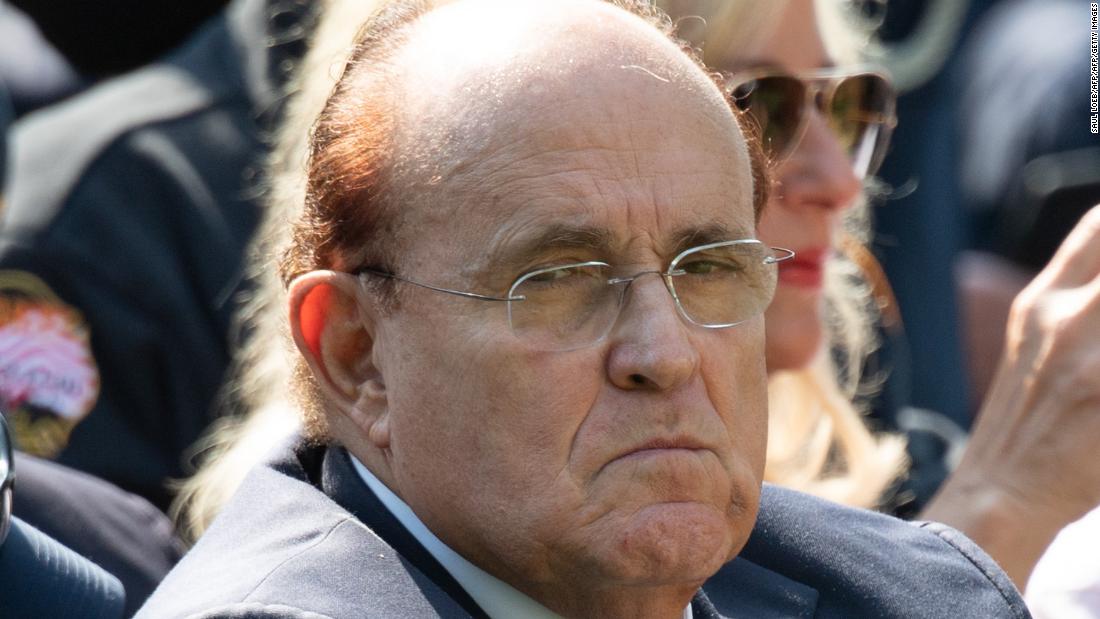The Rudy Show is a hot ticket. It’s a mesmerizing, wild-eyed performance that invites an inevitable question: What happened to Rudy? The truth is, nothing happened. The Rudy we see today, with his showstopping mix of conviction and incoherence, is the same Rudy we’ve always had. The only thing new is his predicament.
The eventual fallout from all this will be some version of historic. Until then it’s just plain fascinating.
There was Giuliani’s
pinballing interview with CNN’s Chris Cuomo, in which he denied he’d done Trump’s bidding before claiming that of course he had.
There was the spectacle of Trump and Giuliani implicating others in the scheme. Trump suggested that reporters should ask for transcripts of Vice President Mike Pence’s
call with Ukrainian leaders. Not to be outdone, Giuliani implicated a State Department official, Kurt Volker, by helpfully
showing text exchanges between the two men. (Finding himself under a bus, Volker resigned the next day.)
Then Giuliani hit the Sunday shows, in a carousel of contradictions, as he doubled down on his debunked conspiracy theories.
Giuliani’s antics, while striking most decent people as utterly insane, will feel sadly familiar to anybody who’s watched his career closely. Giuliani, an opera buff, has made his time on the public stage an endless aria of political pettiness, braying self-aggrandizement and ethical and personal turmoil. Only the settings change.
As Mayor of New York, Giuliani delivered on his campaign promise to crack down hard on squeegee men and the homeless. The economy improved under his watch. Crime dropped, precipitously. Rudy took credit for it all, some of which he even deserved. But when he felt his Police Commissioner Bill Bratton
was getting too much credit for the drop in crime, Giuliani unceremoniously
accepted his resignation. Giuliani’s moth-like penchant for the limelight had gotten the better of him.
Sickening police abuse also happened on Mayor Giuliani’s watch.
Haitian immigrant Abner Louima was sodomized in a Brooklyn station house. Two officers were originally convicted in the assault in 1999, and three were later convicted of covering up the attack. In 2002, three of the convictions in the case were overturned
There were other troubling incidents. Guinean immigrant Amadou Diallo was shot 41 times and killed by cops who claimed he had a gun. He didn’t. The four officers indicted for his killing were acquitted of all charges. An unarmed Patrick Dorismond was shot and killed by an undercover officer during a bungled drug sting. A New York grand jury declined to indict the police officer. In each case, Giuliani defended the NYPD, despite evidence of misconduct. In Dorismond’s case, Giuliani assassinated the dead man’s character himself, by
unsealing Dorismond’s (irrelevant) juvenile arrest record.
Offering a full-throated defense of the clearly indefensible? Yep, that’s our Rudy.
Even 9/11 didn’t “transform” Giuliani, as the mythology suggests. It did help his image, sure. New Yorkers had grown well and truly weary of their mayor. He’d become an object of ridicule, prowling the city, wringing his hands, looking for controversy to devour. His response to the disaster, however, was skillful and reassuring. It went beyond his bang-up job of walking and pointing that multiple news crews captured in the moments after the attack.
In the following days and weeks Giuliani projected a paternal calm that seemed inversely proportional to the anarchy around him. “We’re going to rebuild, and we’re going to be stronger than we were before,” he said. Even his greatest detractors believed him. Oprah Winfrey bestowed on him a title that stuck: America’s Mayor.
Giuliani seemed like a different guy. He wasn’t. We were. He displayed the same proclivities and deficiencies he always had. But in chaos, we interpreted them as assets. His paranoia read as preparedness. His pushiness felt like leadership. His dogmatism became resolve.
Giuliani’s poll numbers spiked. So, ever the opportunist,
as his mayoral term came to a close, he founded Giuliani Partners, a security and management consulting firm. He galloped around the globe, selling an ungainly suite of services (“Physical Security”, “Criminal Justice Reform”, “Investigations”) to any leader or nation-state that would have him.
But as his name recognition grew, his stature shrank. His 2008 presidential bid ended
in a shocking flame-out. And by 2016 his foreign entanglements had become so complex they prevented him, in part, from becoming Trump’s Secretary of State. “Rudy’s just got so many complications,” a transition aide
told Politico at the time.
Instead he became Secretary of Shadows. Giuliani now runs sensitive diplomatic missions, not for the United States, but for Trump personally, as the President’s lawyer, his
Tom Hagen.
Trump and Giuliani share many traits. They’re both funhouse-mirror versions of tough guys. They both equate law-and-order with bully-and-berate. They’re
both philanderers. (As mayor, Giuliani publicly announced he was separating from his wife, without her knowledge, then married the woman he was having an affair with, whom he is now divorcing.)
But the trait Trump and Giuliani really have in common is consistency. We can count on Trump to tear up precedent, linguistics and all manner of societal, diplomatic and ethical norms. Giuliani can be counted on, too, to hog the spotlight, ignore the evidence and bend the law. “He is the same guy … who did all that aggressive stuff as mayor,”
Giuliani’s friend and former New Jersey Gov. Chris Christie said last year, when Giuliani signed on as Trump’s new fixer. “Now that he is the leader of the Trump legal team, he’s all in for the President.”
The context may change, but Giuliani stays the same. He’s like the favorite character on a tired sitcom that network execs just can’t bring themselves to cancel. How could they, when he’s so much fun to watch?

